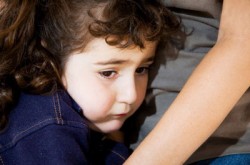Separation Anxiety Disorder Symptoms
Infants and toddlers experiencing symptoms of anxiety upon a parent’s departure are at a normal stage of development. When these same symptoms continue into childhood and adolescence, separation anxiety disorder may be the cause.
According to the University of Florida’s Center for Trauma, Anxiety, Resilience and Prevention, as much as four to five percent of children and young adolescents suffer from separation anxiety disorder. Symptoms of separation anxiety disorder can vary depending on circumstances in the home and in the child’s life. Separation anxiety can also develop as a symptom of other anxiety disorders.
Separation Anxiety Disorder
Infants and toddlers in general have yet to develop a sense of time and place. This lack of development accounts for the feelings of anxiety experienced when a parent moves outside of their visual field. Infants and toddlers are also just learning to distinguish caretakers from strangers, which also contributes to anxiety feelings. Some children move past these feelings sooner than others, though three years old is the standard cutoff age for normal child development.
In the case of children and young adolescents, their sense of time and place has reached a point where they should know a parent will come back. Separation anxiety disorder becomes a factor when a child experiences feelings of worry that are out of proportion with the temporary departure of a parent. When these feelings prevent a child from carrying out normal, everyday activities, a psychological disorder may be at work.
Symptoms

Separation anxiety disorder affects roughly 4 to 5 percent of all children.
Separation anxiety disorder symptoms must exist apart from any other psychological conditions or else the symptoms a child experiences may actually be the result of an underlying condition. The presence of a developmental disability, such as pervasive developmental disorder or schizophrenic-like behaviors would rule a separation anxiety disorder diagnosis.
In cases where separation anxiety disorder exists as the root problem, a child must exhibit a minimum of three of the following symptoms for at least a month’s time:
- Ongoing worries about a parent being harmed or dying
- Worries about being kidnapped or getting lost
- Not wanting to go to school on a repeated basis
- Not wanting to sleep without a parent nearby
- Repeated nightmares of being taken away or separated from a parent
- Experiencing physical symptoms, such as stomach aches or headaches when separated from a parent or when expecting to be separated from a parent
Symptom Causes
Both genetic and environmental factors can contribute to the likelihood a child will develop separation anxiety disorder. Children who develop this condition often come from families with a history of anxiety disorders. Children whose mothers experienced stressful pregnancies also have an increased risk of developing separation anxiety.
Environmental factors have more to do with a child’s home life. Ongoing marital problems or family conflicts can cause a child to develop separation anxiety symptoms. Traumatic events, such as a divorce or the death of a loved one can also trigger separation anxiety in a child.
In cases where a family history exists, medication treatment may be warranted to help reduce symptoms to the point where a child can carry out everyday activities. Therapy sessions may also help a child better understand and cope with anxiety feelings.
Resources:
University of Central Florida – Center for Trauma, Anxiety, Resilience and Prevention
http://psychology.cos.ucf.edu/ctarp/anxiety-disorders/separation-anxiety-disorder/





